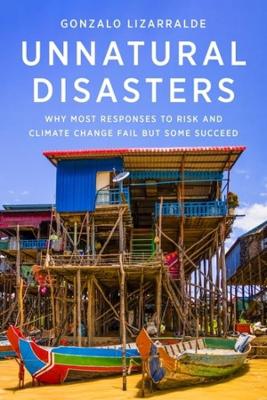
Storms, floods, fires, tsunamis, earthquakes, tornadoes, and other disasters seem not only more frequent but also closer to home. As the world faces this onslaught, we have placed our faith in “sustainable development,” which promises that we can survive and even thrive in the face of climate change and other risks. Yet while claiming to “go green,” we have instead created new risks, continued to degrade nature, and failed to halt global warming.
Unnatural Disasters offers a new perspective on our most pressing environmental and social challenges, revealing the gaps between abstract concepts like sustainability, resilience, and innovation and the real-world experiences of people living at risk. Gonzalo Lizarralde explains how the causes of disasters are not natural but all too human: inequality, segregation, marginalization, colonialism, neoliberalism, racism, and unrestrained capitalism. He tells the stories of Latin American migrants, Haitian earthquake survivors, Canadian climate activists, African slum dwellers, and other people resisting social and environmental injustices around the world. Lizarralde shows that most reconstruction and risk-reduction efforts exacerbate social inequalities. Some responses do produce meaningful changes, but they are rarely the ones powerful leaders have in mind.
This book reveals how disasters have become both the causes and consequences of today’s most urgent challenges and proposes achievable solutions to save a planet at risk, emphasizing the power citizens hold to change the current state of affairs.
Excellent Within Scope, Ignores Alternative Explanations. This one was a bit weird. About halfway into the narrative, I was thinking this was going to be a three star at best, because it was *so* hyper "woke" / "progressive". But then I read the description - I had picked up the ARC on the strength of the title alone - and saw that most all of the problems I had with the book were *exactly what the description said the book would have*. Well, crap. Ok, *within that scope*, this book is a true 5* narrative. Maybe a touch light on the bibliography at just 17% or so of the overall length of the book (more normal range is 20-30% in my experience), but not too terrible there. But ultimately I had to ding a star because it *does* lean too much into the author's own biases and refuses to consider - and at times even outright dismisses - alternative explanations such as risky geography and geology, among others, in many of the disasters it covers. Still, the book has a lot of solid points about the modern "green" / "sustainable" / "resilient" building movements, if solidly from the "woke" / "progressive" side. Enough that even if you are one that normally can't stomach such tripe (I myself am largely among this camp), this text really does have enough good material that you need to wade through it to see the arguments from even that perspective. Recommended.
Reading updates
-
Started reading
-
2 July, 2021:
Finished reading
-
2 July, 2021:
Reviewed
